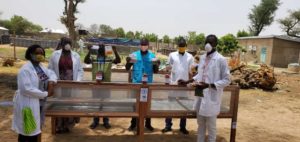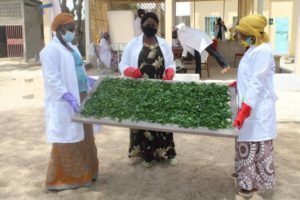FAO Cameroon is training producers to process and conserve their food
Article written by Gaëlle Massack Epse Ngando Mbaye, Communications Officer FAO Cameroon and Aissa Mamadoultaibou, Nutrition Officer for Central Africa FAO SFC The use of solar dryers: producers appreciate an innovation that can process and conserve fruit and vegetables while preserving their nutritional status….
Article written by Gaëlle Massack Epse Ngando Mbaye, Communications Officer FAO Cameroon and
Aissa Mamadoultaibou, Nutrition Officer for Central Africa FAO SFC
The use of solar dryers: producers appreciate an innovation that can process and conserve fruit and vegetables while preserving their nutritional status.
In the midst of the Covid-19 pandemic, FAO Cameroon is training producers in the Far North region to process and conserve their food.
The Covid-19 pandemic is having a negative impact on all areas of Cameroon life. In the Far North, already beset by Boko Haram, people are finding it difficult to diversify their diet, which mainly consists of cereals and pulses. The measures required to respond to the spread of Covid-19 have only made matters worse by limiting their access to food resources, including those that strengthen the body’s immune system. Alongside this, there is a considerable risk of declining incomes for small producers, who face increased post-harvest losses due to difficulties in being able to get their produce to market.
In response to these concerns, the United Nations Food and Agriculture Organization (FAO) has come up with an innovative way of processing food that enables it to last longer while preserving its nutritional status: solar dryers.
This activity forms part of the project entitled “Improving the food security of populations (internally displaced, hosts, refugees and returnees) affected by the crisis in the Far North and South West/North West of Cameroon” being funded through the United Nations Central Emergency Response Fund (UNCERF).
By providing technical support to the Ministry of Agriculture and Rural Development, and with the cooperation of its implementing partner, the Association for Development and Fish Farming in the North (Association pour le développement et la pisciculture dans le Septentrion), the FAO has provided training to women’s groups (set up as common interest groups) and producers already involved in the farmers’ field school groups on the processing and solar drying of fruit and vegetables.
One hundred and one (101) of the most vulnerable women and men from Mayo-Tsanaga and Mayo-Danay departments have benefited from this training.
Djibriné Abba, a beneficiary from Houdanol in Maga district, testifies to this satisfaction: “With the help of the FAO, I am growing and harvesting okra, which I sell at the market. I make a considerable profit and with this I buy rice, meat and other food I need for my family. Now that I know how to dry my okra, I think I can really improve my household income.”
Drying and storing food to improve food and nutritional security
The advantages of using solar dryers:
- They retain micronutrients and active ingredients (unlike those dried directly in the sun) and are easy to reconstitute by soaking.
- They improve supplies of dried fruit, vegetables and leaves and help improve households’ nutritional status by strengthening the immune system, which is particularly important during the Covid-19 pandemic.
- They offer communities the opportunity to diversify their sources of income by enhancing the value of their horticultural produce.

